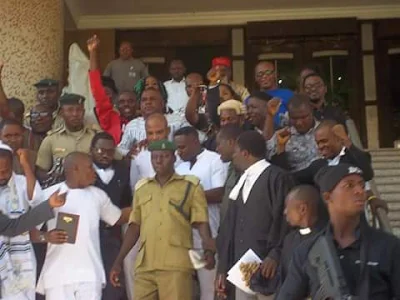Counsel to Nnamdi Kanu, pro-Biafra agitator, Ifeanyi Ejiofor, has described his client as a political prisoner who has committed no offence.
Ejiofor made the remark while maintaining that the Indigenous People of Biafra, IPOB, is not unlawful as ruled by Justice Binta Nyako in 2017.
In a statement he issued on Thursday, after his meeting with Kanu, he expressed hope that the IPOB leader would get justice soon.
According to Ejiofor: “I had an extensive interaction/chat with our indefatigable client- Onyendu Mazi Nnamdi Kanu during today’s routine visit to the National Headquarters of the Department of State Services (DSS).
“It is on record that by the ruling of Justice Nyako delivered in 2017, His Lordship while ruling on our application, held that IPOB is not an Unlawful Organisation. This Ruling of the Court was not appealed against, neither was it set aside by any Superior Court.
“We are not relenting in our efforts to ensure that justice is done to our Client, he will be freed and in no distant time, because he has committed no offence known to law. He is at best, a Political Prisoner. Nevertheless, Victory will be ours in the end. I see!”
The pro-Biafra agitator was first arrested in 2017.
Upon his arrest and arraignment, Justice Nyako had granted Kanu bail.
However, he jumped bail and moved to Europe where he continued with his secession activities.
He was, however, rearrested in 2021 in a country believed to be Kenya and repatriated to Nigeria.
Upon Kanu’s return to Nigeria, he was locked up in the custody of the Department of State Services, DSS.

Comments
Post a Comment
https://saviournicodemus.blogspot.com